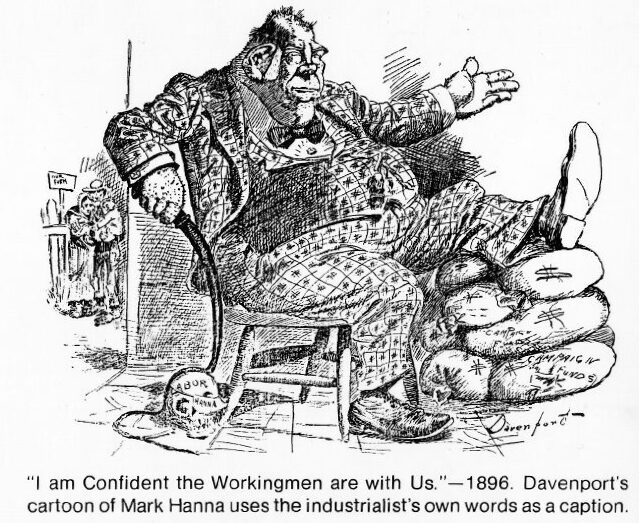A few years ago, my grandmother gave me a gift. It was a hand-me-down, but a unique one. She gave me an original absentee ballot from the 1896 presidential election. I was excited not only that the 100-year-old document was still intact but also that it was from the 1896 election in particular—an important election in the history of our republic, but not just because of who won the presidency.
This month marks the fourth anniversary of the Supreme Court’s Citizens United decision that I’ll discuss later in this post. And last week, I wrote about our need to fix our political system so that our nation can advance more evidence-based and democratic decision making. I used some of my family history to talk about our nation’s history of valuing science and the democratic process and introduced recent hurdles put in place by the astronomical levels of money in politics we have today.
William McKinley, campaign finance, and protecting our democracy

An 1896 political cartoon featuring McKinley’s campaign manager Mark Hanna and his “campaign funding” from industry. Photo: Wikimedia Commons
Don’t get me wrong, money in politics is nothing new and the 1896 presidential election showed this. The main contenders were William McKinley and William Jennings Bryan. In an unprecedented move, McKinley used “financiers and industrialists” to fund his campaign, ultimately outspending and defeating his opponent.
But our decision makers at the turn-of-the-century foresaw the dangers of direct funding of campaigns by corporations. They saw the threat it posed to our democracy. And they responded. Following the corporate-funded 1896 election, many states passed campaign finance laws and in 1907, the U.S. Congress passed the Tillman Act, banning the direct financing of elections by businesses to political parties and election committees. Though imperfect, the law was the first attempt at federal control over campaign finance and several laws were subsequently passed to strengthen the rules.
In short, our leaders responded to the problem of corporate money influencing elections by creating a set of checks and balances that helped preserve a government ruled by the people. Their efforts limited the influence of money on our elections for some time, but recent threats have emerged.
Citizens United: Partying like it’s 1896
In 2010 the Supreme Court’s ruling in Citizens United v. Federal Election Commission opened the floodgates to unlimited corporate spending on political activities. Since then, there has been a drastic increase in political spending by companies, largely through “dark money” groups such as trade associations and “social welfare” organizations. This indirect funding allows companies to stay anonymous while groups do their political bidding, essentially giving them “a free pass” to use their trade groups to influence policy, as trade associations and other politically active organizations are not required to disclose their donors to the public. Corporations can thereby influence political debates without accountability.

An original (though in poor shape) absentee ballot for the 1896 presidential election that my family has kept. The election was the first time that a U.S. Presidential campaign (William McKinley’s) had been largely financed by corporations.
The Supreme Court’s decision in Citizens United relied on the assumption of “prompt disclosure of expenditures,” which would allow shareholders to hold companies accountable (Editorial Board 2013). In the absence of an SEC rule, however, such disclosure is virtually nonexistent, given that companies can legally remain nameless donors to trade groups and other outside organizations that are politically active.
This secrecy is problematic, especially when it comes to public policy issues where companies’ positions may not align with the public interest. Many science-based issues fall in this category. In issues like climate change, FDA drug approvals, and chemical safety, we’ve found that corporate interests can pour tremendous funds into the political system and defeat measures that would protect our health and safety. And unfortunately, they often win.
Solving money in politics today
In his book The Price of Civilization, the Columbia University economist and advocate Jeffrey Sachs criticized the role of corporations in government lobbying. When discussing the possible solutions he wrote, “America’s problems may seem insoluble today, but that’s mainly because the United States has gotten out of the practice of true social reform and problem solving.”
As a nation we’ve solved many seemingly impassable issues in the past, broadly speaking and with money in politics in particular. The McKinley election represented a fundamental shift in campaign finance, yet decision makers responded with new protections for fair elections. Even though threats to our democracy constantly emerge, we can fix this. We can adapt to the changing political landscape and continue to persevere in order to ensure that our democracy is protected. Our history as a nation tells me that this is within our reach.
